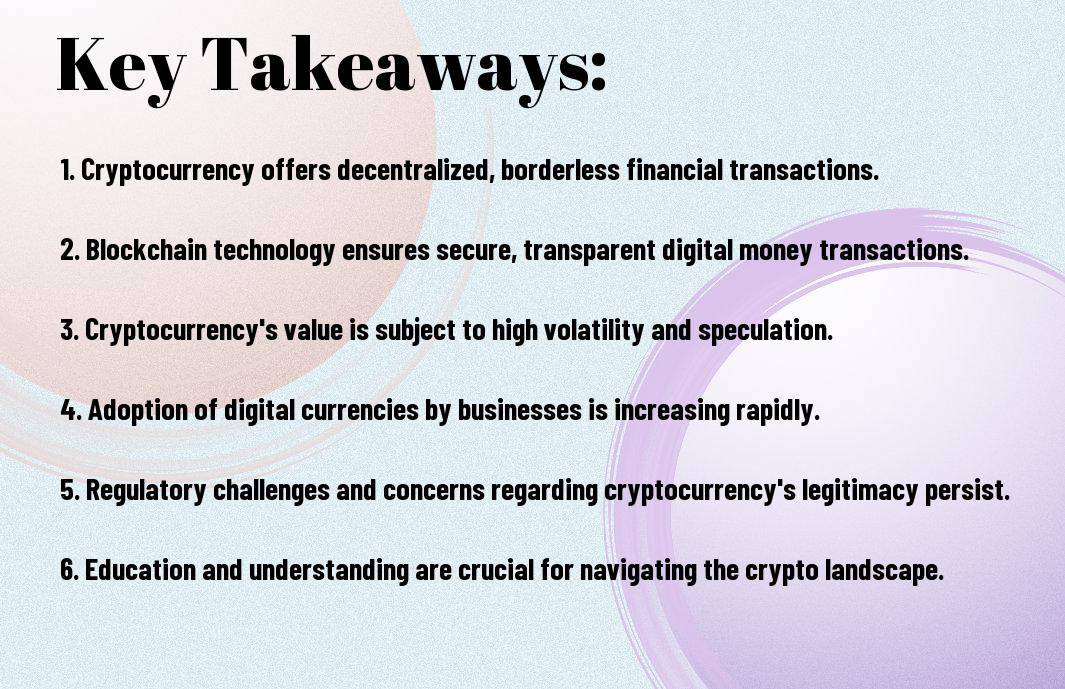Many people are still unsure about the role of cryptocurrency in the future of finance. With the growing popularity of digital currencies like Bitcoin and Ethereum, it is vital to understand the benefits and risks they bring to the table. Cryptocurrency has the potential to revolutionize the way we handle transactions, offering decentralized, secure, and fast alternatives to traditional banking systems. However, concerns about volatility, security, and regulation must also be addressed before widespread adoption can occur. In this blog post, we will demystify digital money and explore whether cryptocurrency truly has the potential to become the future of finance.

Key Takeaways:
- Cryptocurrency is revolutionizing the future of finance: Cryptocurrencies are changing the way we think about money, offering new possibilities for transactions and financial services.
- Blockchain technology is the backbone of cryptocurrencies: The decentralized and secure nature of blockchain technology ensures trust and transparency in cryptocurrency transactions.
- Regulation is key to widespread adoption: Clear regulations and guidelines are crucial for the mainstream acceptance and stability of cryptocurrencies in the financial market.
- Volatility remains a challenge: The highly volatile nature of cryptocurrencies makes them a risky investment, requiring careful consideration and risk management strategies.
- Use cases are expanding: Cryptocurrencies are not limited to investment but have real-world applications in areas like cross-border payments, smart contracts, and decentralized finance.
- Education is important: Understanding the basics of cryptocurrencies and blockchain technology is vital for individuals and businesses to make informed decisions in the digital financial landscape.
- Adoption is on the rise: More businesses and financial institutions are starting to embrace cryptocurrencies, signaling a shift towards a more digital and decentralized future of finance.

Understanding Digital Money
You Digital Money Demystified: Go From Cash to Crypto …
Definition and Types of Digital Money
As far as digital money, it refers to any form of money that exists in electronic form rather than physical coins or banknotes. With the advancement of technology, digital money has become more prevalent, offering convenience and efficiency in financial transactions. There are various types of digital money, including central bank digital currencies (CBDCs), cryptocurrencies, e-wallets, and online payment systems.
Cryptocurrencies, such as Bitcoin and Ethereum, are decentralized digital currencies that use encryption techniques to regulate the generation of units and verify the transfer of funds. CBDCs are digital versions of a country’s fiat currency issued by the central bank. On the other hand, e-wallets and online payment systems like PayPal and Venmo allow users to store and transfer money electronically. After reviewing these types, you can choose the right one to suit your financial needs.
| Types of Digital Money | Key Features |
| Cryptocurrencies | Decentralized, uses encryption techniques |
| CBDCs | Digital versions of fiat currency issued by central banks |
| E-wallets | Allow users to store and transfer money electronically |
| Online payment systems | Facilitate electronic transactions |
How Digital Currencies Work
To understand how digital currencies work, you need to examine into the concept of blockchain technology. Blockchain is a decentralized digital ledger that records all transactions across a network of computers. When a transaction occurs, it is added to a block and linked to the previous block, forming a chain of blocks. This transparent and secure system ensures the integrity and validity of transactions.
Additionally, digital currencies operate on a peer-to-peer network, eliminating the need for intermediaries like banks. Transactions are verified by network participants known as miners, who use complex algorithms to validate and secure the network. This decentralized approach enhances security, reduces costs, and promotes financial inclusivity.
After mastering the basics of how digital currencies work, you can explore the exciting world of blockchain technology and its potential applications in various industries.
The Rise of Cryptocurrencies
Historical Background of Cryptocurrencies
An important aspect of understanding the rise of cryptocurrencies is grasping the historical background that brought about their existence. In 2009, the enigmatic figure known as Satoshi Nakamoto introduced Bitcoin, the first decentralized cryptocurrency, marking a significant milestone in the financial world. The decentralized nature of cryptocurrencies meant that they were not governed by any central authority, such as a government or financial institution, which intrigued many individuals seeking autonomy over their finances.
Key Players: Bitcoin and Altcoins Explained
When delving into cryptocurrencies, it is vital to differentiate between Bitcoin, the pioneering cryptocurrency, and altcoins, the alternative digital currencies that followed. Bitcoin remains the most prominent and widely traded cryptocurrency in the market, often referred to as digital gold for its store of value characteristics. Altcoins, on the other hand, encompass a diverse range of cryptocurrencies beyond Bitcoin, each with its unique features and purposes.
Understanding the distinctions between Bitcoin and altcoins is crucial for investors looking to navigate the cryptocurrency landscape. While Bitcoin’s dominance in the market is undeniable, altcoins offer innovative technologies and use cases that cater to specific niches within the crypto space. It is important to conduct thorough research and due diligence when considering investments in either Bitcoin or altcoins to make informed decisions based on individual financial goals and risk tolerance.

Benefits of Cryptocurrencies
Decentralization and Security
For those looking to explore the world of digital money, cryptocurrencies offer a promising solution. The decentralized nature of cryptocurrencies ensures that transactions are secure and resistant to fraud. Every transaction is recorded on a public ledger known as the blockchain, which is constantly verified by a network of nodes. This decentralized system eliminates the need for intermediaries, making it difficult for hackers to manipulate the network. With a focus on security and privacy, cryptocurrencies present a new way to securely store and transfer value.
Lower Transaction Costs and Global Accessibility
An intrinsic advantage of cryptocurrencies is the lower transaction costs associated with using them. Traditional financial institutions often charge hefty fees for international transfers and currency exchanges. However, with cryptocurrencies, transactions can be made directly peer-to-peer, cutting out the middleman and reducing costs. Additionally, cryptocurrencies provide access to financial services for individuals in regions with limited banking infrastructure, fostering financial inclusion on a global scale.
In addition to lower transaction costs, cryptocurrencies offer global accessibility. As long as individuals have access to the internet, they can participate in the cryptocurrency economy. This opens up new opportunities for those who may not have had access to traditional banking services, leveling the playing field for global financial participation.
Transparency and Immutability of Transactions
Any participant in the cryptocurrency network can view the transaction history of any public address. This level of transparency ensures accountability and reduces the potential for fraudulent activities. Transactions recorded on the blockchain are immutable, meaning they cannot be altered or deleted once confirmed. This feature adds a layer of security and trust to the cryptocurrency ecosystem, providing users with more control over their finances.
Immutability: The irreversible nature of transactions on the blockchain prevents tampering and fraud, ensuring the integrity of the entire system. This feature also enables individuals to track the flow of funds with certainty, promoting trust and accountability within the cryptocurrency space.
Challenges and Criticisms
Regulatory and Legal Hurdles
All emerging technologies face regulatory and legal challenges, and cryptocurrency is no exception. The decentralized nature of many cryptocurrencies poses difficulties for traditional financial regulators who are used to centralized control. Issues such as money laundering, tax evasion, and fraud have raised concerns among governments worldwide. Additionally, the lack of a clear regulatory framework for cryptocurrencies creates uncertainty for investors and users alike. Without proper oversight, the risk of illicit activities remains a significant challenge for the adoption of digital currencies.
Volatility and Market Risks
Any discussion of cryptocurrency must address the elephant in the room – volatility. The extreme price fluctuations in the cryptocurrency market have made it a risky investment for many. The unpredictable nature of these digital assets can lead to substantial gains or losses within a short period, making it a speculative endeavor rather than a stable store of value. Market risks such as hacking incidents, exchange shutdowns, and lack of consumer protection further add to the concerns surrounding the viability of cryptocurrency as a mainstream financial instrument.
Volatility in the cryptocurrency market is driven by various factors, including market speculation, regulatory developments, and technological advancements. The lack of intrinsic value and the dependency on market sentiment make cryptocurrencies vulnerable to sudden price swings. Investors must exercise caution and be prepared for the inherent risks associated with trading digital currencies.
Issues of Scalability and Energy Consumption
Challenges surrounding scalability and energy consumption are critical hurdles that cryptocurrency must overcome for widespread adoption. The scalability issues have plagued major cryptocurrencies like Bitcoin and Ethereum, leading to slow transaction speeds and high fees during peak usage times. Moreover, the energy-intensive process of mining cryptocurrencies raises environmental concerns, with critics pointing to the significant carbon footprint associated with proof-of-work algorithms.
With advancements in technology and the emergence of alternative consensus mechanisms like proof-of-stake, efforts are underway to address the scalability and energy consumption issues in the cryptocurrency space. The development of layer 2 solutions and eco-friendly blockchain platforms aims to make digital currencies more efficient and sustainable in the long run.

Cryptocurrency in the Financial Ecosystem
Impact on Banks and Traditional Financial Institutions
On the horizon of the financial landscape, the emergence of cryptocurrency has posed both challenges and opportunities for traditional banks and financial institutions. While some view cryptocurrencies as a threat to the traditional banking system, others see potential for collaboration and innovation in the future. As blockchain technology gains popularity and trust, banks are exploring ways to integrate digital assets into their services to stay competitive in a rapidly evolving industry.
Crypto and the Stock Market: Correlations and Investment Strategies
Cryptocurrency’s relationship with the stock market is a topic of growing interest among investors. As digital assets become increasingly mainstream, the correlation between cryptocurrency prices and traditional stock market movements is a subject of much debate. Understanding these correlations can help investors develop diversified portfolios and minimize risks associated with market fluctuations.
Investment in cryptocurrency requires a deep understanding of market dynamics and risk management strategies. Diversification and long-term investment goals are crucial components of a successful crypto investment strategy. It is crucial to stay informed about market trends, regulatory developments, and technological advancements to make informed decisions when entering the crypto market.
The Role of Stablecoins and Central Bank Digital Currencies (CBDCs)
Traditional financial systems are increasingly exploring the potential of stablecoins and central bank digital currencies (CBDCs) to enhance the efficiency of cross-border transactions and payment systems. Stablecoins, pegged to fiat currencies, aim to provide stability and reduce the volatility often associated with cryptocurrencies. CBDCs, on the other hand, are digital forms of a country’s fiat currency issued and regulated by the central bank, offering a secure and transparent means of digital transactions.
A comprehensive understanding of stablecoins and CBDCs is crucial for navigating the future of digital finance. As these digital assets continue to gain traction, policymakers and financial institutions must carefully consider the implications of integrating them into the existing financial ecosystem to promote financial inclusion and innovation while mitigating potential risks.
Future Trends and Predictions
Advancements in Blockchain Technology and Adoption
Not only is blockchain technology changing the landscape of digital transactions, but it is also revolutionizing various industries such as finance, healthcare, and supply chain management. The advancements in blockchain technology, such as smart contracts and decentralized applications, are streamlining processes, reducing costs, and enhancing security. As adoption of blockchain increases across businesses and governments, we can expect a more transparent, efficient, and secure ecosystem for digital transactions.
The Role of Cryptocurrency in Emerging Markets
Emerging markets are increasingly turning to cryptocurrency as a solution to financial instability, inflation, and lack of access to traditional banking services. With cryptocurrencies like Bitcoin and Ethereum gaining popularity, people in these regions are exploring new ways to store value and conduct transactions. This trend is not only empowering individuals with more financial control but also opening up opportunities for economic growth and financial inclusion.
With the rise of mobile technologies and internet connectivity, emerging markets are poised to leapfrog traditional banking systems and embrace cryptocurrencies as a reliable and accessible form of digital money. As more businesses and governments in these regions adopt blockchain technology and cryptocurrencies, we may witness a significant shift in the global financial landscape.
Predictive Analysis: Mainstream Adoption or Niche Market?
Cryptocurrency has the potential to disrupt traditional financial systems and become a mainstream form of digital currency. The integration of cryptocurrencies into everyday transactions, investments, and even salary payments is becoming more prevalent. However, there are still challenges to overcome, such as regulatory uncertainty, price volatility, and security concerns. As the market matures and technology advances, the future of cryptocurrency could either see widespread adoption or remain confined to a niche market for tech enthusiasts and early adopters.
Advancements in blockchain technology and the increasing acceptance of cryptocurrency in emerging markets signal a transformative shift in the financial industry. While the path to mainstream adoption may still be uncertain, the potential for cryptocurrencies to revolutionize the way we transact and store value is undeniable.
To wrap up
With these considerations in mind, it is evident that cryptocurrency has the potential to revolutionize the future of finance. Its underlying technology, blockchain, offers secure and transparent transactions, while its decentralized nature challenges the traditional financial systems. However, there are still challenges to overcome, such as regulatory concerns and scalability issues.
Despite these hurdles, the increasing adoption and investment in cryptocurrency suggest that it is here to stay. As more businesses and individuals embrace digital money, it is important to stay informed and understand the risks and benefits involved. Ultimately, the future of finance may indeed be digital, with cryptocurrency at the forefront of this transformation.
FAQ
Q: What is cryptocurrency?
A: Cryptocurrency is a digital or virtual form of currency that uses cryptography for security and operates independently of a central authority, such as a government or bank.
Q: How does cryptocurrency work?
A: Cryptocurrency works through a technology called blockchain, which is a decentralized and distributed ledger that records all transactions across a network of computers.
Q: Is cryptocurrency legal?
A: The legality of cryptocurrency varies by country. While some countries have embraced it, others have imposed restrictions or outright bans on its use.
Q: How can one acquire cryptocurrency?
A: Cryptocurrency can be acquired through cryptocurrency exchanges, where you can buy, sell, and trade different types of digital currencies using fiat money or other cryptocurrencies.
Q: What are the advantages of using cryptocurrency?
A: Some advantages of using cryptocurrency include lower transaction fees, faster cross-border transactions, increased financial privacy, and decentralization.
Q: What are the risks associated with cryptocurrency?
A: Risks associated with cryptocurrency include price volatility, lack of regulation leading to potential scams and fraud, hacking and security breaches, and the potential for money laundering and illegal activities.
Q: Is cryptocurrency the future of finance?
A: While cryptocurrency shows potential to revolutionize the financial industry, its future is uncertain due to regulatory challenges, technological limitations, and ongoing debates about its role in the traditional financial system.



